A Parents Guide to Online Gaming
So, you’re getting hassled about online gaming: your child has started gaming or wants to start, they’re telling you ‘back off, I know what I’m doing, I’m sensible. I know the box says it’s for over 18s only but all my mates are playing it.’ Kids are now growing up in an ever digital world, sometimes so unfamiliar to you as a parent that keeping them safe online seems utterly daunting. The media will scream at you: Grooming! Violence! Strangers! Addiction! Sudden refusal to leave the game to use the toilet!
But, don’t freak out, at Ditch the Label we want to help parents be informed about the choices they make with their kids when it comes to life online. In this article, we take a look at gaming, whether your child is into online gaming or not, it’s likely someone they know is. With approximately 32.4m people playing games every year in the UK and now a £100 billion industry, gaming has become the largest form of entertainment across the globe.
Keeping your child safe when gaming:
Games have an age rating (similar to the one the movies use), this means the Video Standards Council Rating Board has deemed the game is only suitable for children over that age. Don’t ignore that rating, it’s telling you that there may be inappropriate content in that game for a younger child. BUT, we also understand how the world works and that parents and kids may want to make that judgement themselves. One of the best ways to see whether a game is suitable in your household is to try it out for yourself. Even if you are not a gamer, you will be able to find out whether it is suitable for your children before they play and whether it includes violence, sexual content or bad language. Make sure you critically analyse the game to see if it kid-friendly.
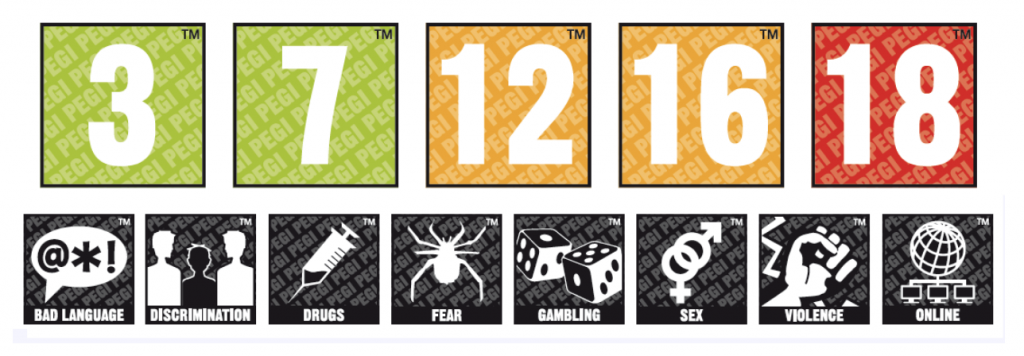
If you are unsure, why not play the game with them? You can sit beside them and discuss things happening in the game in a casual manual – it’s likely your child will enjoy that their parent is engaging in a hobby of theirs, either that or they’ll be howling with laughter at your lack of gaming ability (like that time you tried to do the floss in front of them).
What are the risks you need to look out for when you’re child is gaming?
- Gaming with other people— Is the game single player or multiplayer? As in, is the game online and does it allow your child to communicate with others either through an in-built chat or another method? If it does, familiarise yourself with how that happens, can they talk to anyone during the game or do they need to accept a friend request? Have an open chat with your child about what’s safe, keep an open dialogue about who their gaming with and the risks involved to talking with people they don’t know online – it often will depend on how old your child is. If you think you’re child is too young, you can choose games that only have single player options (see below for some ideas)
- Inappropriate language and content — often the media will focus on grooming as the biggest risk to children and young people when they’re online but perhaps a more instant risk is that they can see all sorts of unmoderated content – some of which will be inappropriate and can include things like swearing, racism, violence or sexual language and behaviour. Again you need to check out what the risks of this happening in the game itself and have a conversation with your child about what they might see and hear. Some games will have an in-built chat filter that will block anything inappropriate being said to your child through text chat, while others provide limited chat options such as “wow” and “hello”. Again, we don’t want you to freak out about these risks but make sure you are informed enough about the game itself to know what they are.
- Bullying in gaming— anything online that allows people to talk to each other does, unfortunately, create an opportunity for cyberbullying and this is the same when it comes to gaming. This could come from people your child doesn’t know but also people they do. For more information about how to deal with cyberbullying, you can visit our cyberbullying hub.
*Not all games have in-built voice chat, some do, some don’t. However, both Xbox and PlayStation consoles allow for players to create a ‘party’ where voice chat is possible even in games that lack functionality – there is software on PC computers that also create this functionality.
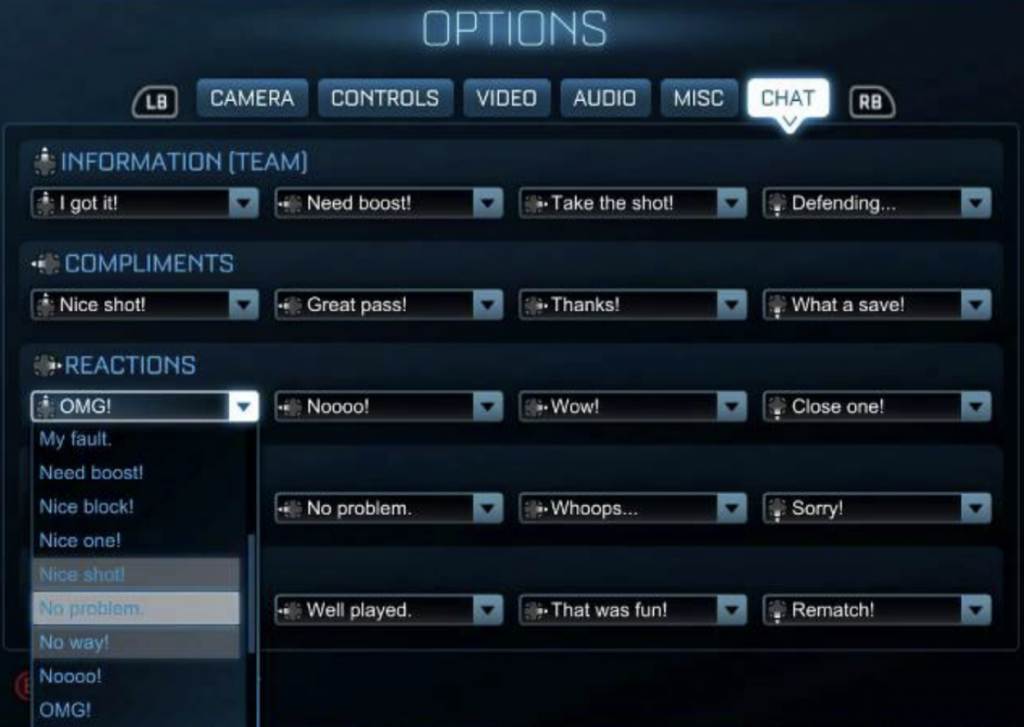
Chat options in a screenshot – taken from Rocket League on the Xbox
How do games make their money? Microtransactions
While some games come with a retail price as they always have done, many games are now free to play and download onto your devices (known as F2P in the gaming industry), these games fund themselves through what is known as ‘microtransactions’ or a ‘season pass’. Micro transactions are typically cosmetic changes to the playable characters or game items that you can pay a small amount of real life money for, while a season pass is an unlockable ‘pass’ that allows the player to unlock time-limited exclusive items and cosmetics in-game for a one-time fee. If you have a card linked to the game being played or device your child is using they may not realising that it is actually costing real money or understand the consequences of doing so.
While multiplayer is always going to have an aspect of danger as you can’t control what other people do on the game – there are a group of games that provide safe spaces for your children to play. We have listed them below:
Mario Kart (Nintendo Switch, Wii U, 3DS)
A colourful racing game featuring a cast of characters from Mario games over the years. Although there are both single player and multiplayer options, there are no text chat or voice comms options.
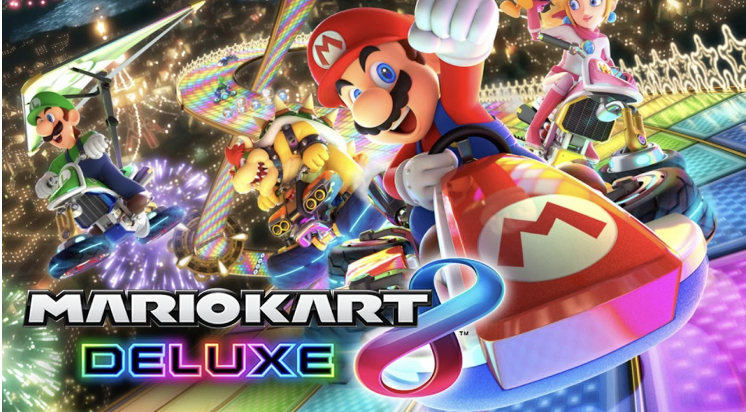
Minecraft (PS4, Xbox One, PC, Switch, Mobile)
One of the biggest selling games of all time, Minecraft has become a cultural phenomenon over the past 9 years since it’s release in 2009. Primarily a game based on exploring, crafting and building, Minecraft enables both offline solo gameplay and multiplayer servers which emphasis on survival, adventures and battle. While the original game mode is extremely family-friendly, any additional servers or mods (custom levels, functionality or objects) need to be tried and tested by you before letting your kid play them.
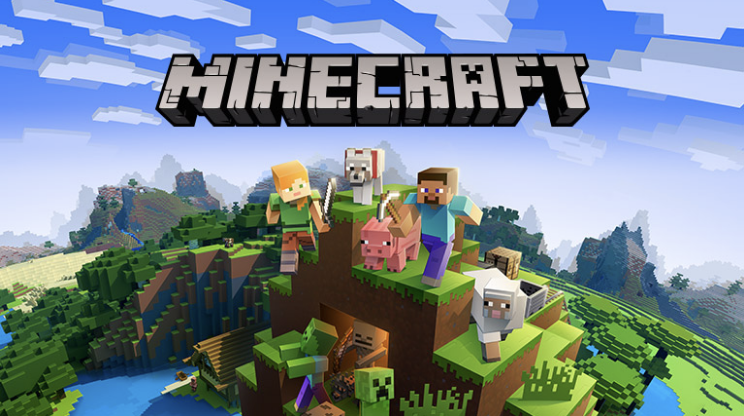
If you want to learn more about Minecraft, minemum.com is a brilliant website for parents.
Terraria (PS4, Xbox One, PC, Switch, Mobile)
Similar in functionality to Minecraft, Terraria is the 2D cousin of the popular building game. With a greater emphasis on exploring, it allows for the same ‘create your own world and adventure feeling’ that Minecraft and toys such as LEGO in real life provide.
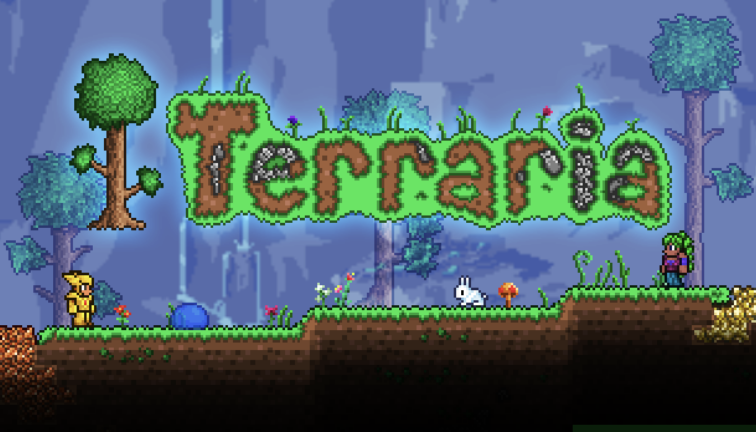
Poptropica
A free, MMORPG (Massively-Multiplayer Online Role-Playing Game), with exploration, safe chat, quests, games, comics, what’s not to love? Poptropica has an optional subscription service where members get Early Access to new Islands and unlimited access to the Poptropica Store. Membership subscriptions renew automatically.

Wizard101
This adventure game is designed to be easy to learn and fun for all ages. Players are encouraged to participate in social activity. It’s a great form of entertainment for families. The £10 monthly subscription fees may seem bad on the surface, however, it is a good thing. Making people pay to play the game does keep trolls away, leaving this game troll free!
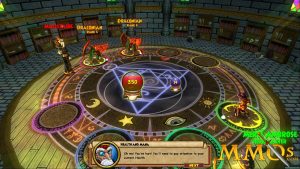
Fifa 18
This football game is one of very few AAA games that are online and very kid friendly. The best part about it is that it’s a great game that you can play with your children as it can be enjoyed by all ages.

Rocket League
Another football game, kinda. This involves playing football in cars and is very child-friendly, due to the in-game chat putting a block on any bad language. This is also a game that can be enjoyable at all ages, which is a plus.

Pokemon
Pokemon is perfect. It teaches the values of friendship, money, loyalty and more. Newer Pokemn games have online features which allow you to trade and battle with people from all over the world. Pokemon has no bad language, blocking out anything resembling a swear word. It also has just the right amount of depth so that it can be a game franchise that they enjoy even into adulthood.

Splatoon 2 (Nintendo Switch)
Splatoon is a team-based third-person shooter game in which the goal is to cover as much of the map in your team’s ink colour. Although Splatoon is limited to Nintendo Switch devices, it has become one of the biggest selling games on the Switch platform. While there are chat options these are limited to such terms such as “Booyah”, “This way”, and “Ouch”.

Single-player only games
While the above is a list of games that can be played online and offline, there are a number of single-player games that are offline (or only with friends and family in the same room as you). These include:
- LEGO games such as LEGO Harry Potter, LEGO Star Wars, LEGO Batman and LEGO Avengers
- Stardew Valley – a game about building a farm, collecting resources and making friends with computer-controlled neighbours
- Little Big Planet – now relatively old with the latest game being released in 2014, Little Big Planet is a puzzle-adventure game that can be played alone or with a friend
- Rayman Legends
- Mario Odyssey
Need some more advice? click here for more parenting tips.













